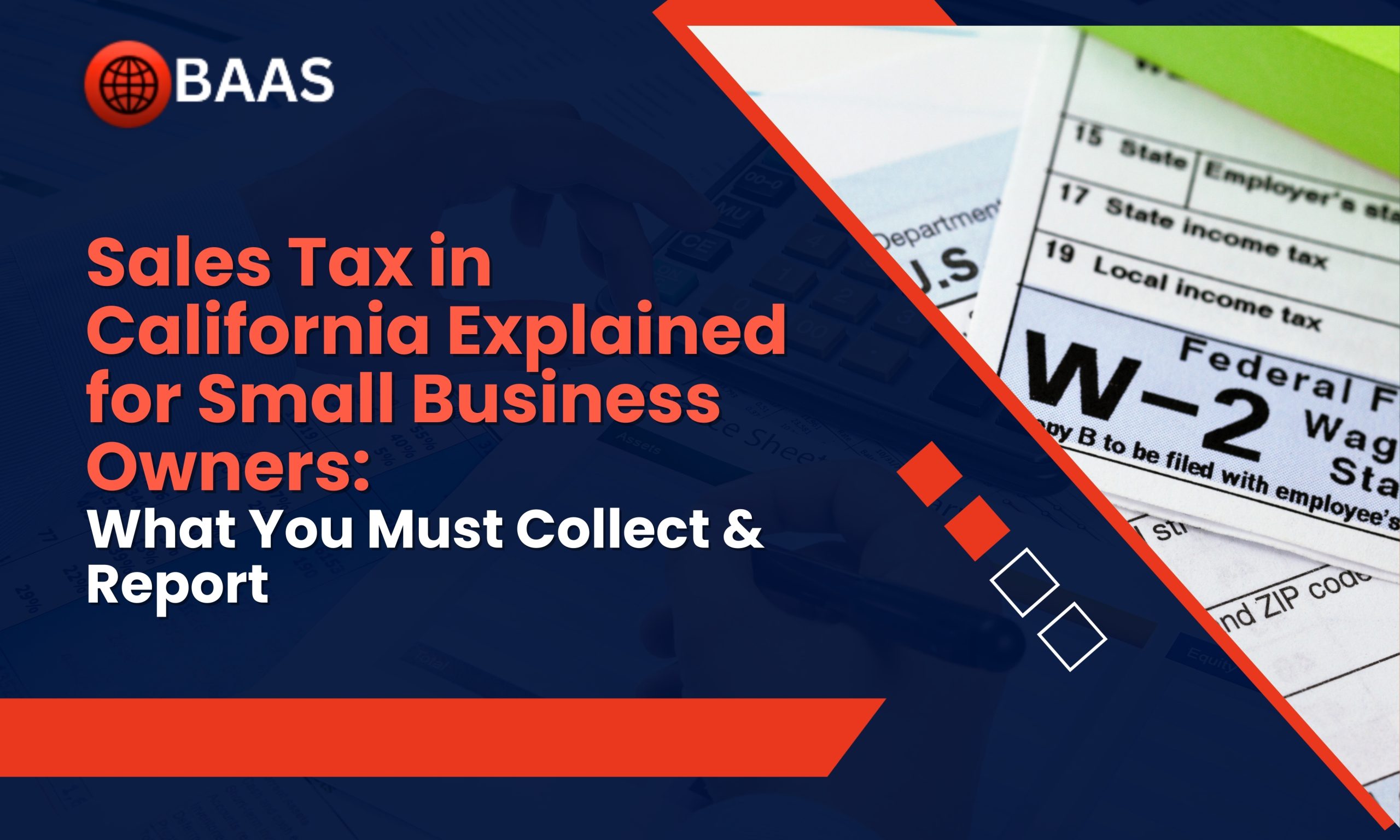Sales Tax in California Explained for Small Business Owners — What You Must Collect & Report
If you run a small business in California, understanding sales tax isn’t optional — it’s mandatory. From brick-and-mortar shops in Fremont to online sellers on Shopify, Amazon, or Etsy, every business owner needs to know what sales tax to collect and how to report it properly.
California’s tax laws are among the most complex in the U.S., and failing to comply can lead to penalties, audits, and unnecessary stress. The good news? With the right knowledge — and the right partner — you can stay compliant and focus on growing your business.
What Exactly Is California Sales Tax?
Sales tax in California is a consumption tax applied to the sale of tangible goods and some services. While the statewide base rate is 7.25%, local county and city rates can add more.
As a small business, you’re responsible for:
- Registering for a seller’s permit
- Collecting the correct tax rate based on customer location
- Reporting & remitting taxes to the California Department of Tax and Fee Administration (CDTFA)
- Common Sales Tax Challenges for California Businesses
Charging the wrong tax rate due to county/city variations
- Misunderstanding marketplace collection rules (Shopify, Amazon, Etsy)
- Missing tax deadlines and filing late returns
- Failing to register for a seller’s permit
- Not separating taxable vs. non-taxable items correctly
Fact: The CDTFA collected over $50 billion in sales tax last year, and small business audits are on the rise.
Why California Sales Tax Is More Complex Than Other States
- Different rates per county/city (Los Angeles vs. Fremont vs. San Diego)
- Special exemptions for certain industries (food, healthcare, manufacturing)
- Marketplace facilitator rules (Amazon, Etsy, eBay collect for you — but you may still need to file)
- Use tax requirements (for goods bought out-of-state and used in California)
- Nexus laws — if you sell to California from another state, you may still owe tax
How to Stay Compliant With California Sales Tax
Step 1: Get a Seller’s Permit — Apply with CDTFA before making taxable sales
Step 2: Track Sales by Location — Use bookkeeping software that maps sales tax rates
Step 3: File on Time — Monthly, quarterly, or annually depending on sales volume
Step 4: Understand Marketplace Rules — Even if platforms collect tax, filing may still be required
Step 5: Work With a Tax Professional — Especially if you operate across multiple cities or online platforms
Why Bay Area Accounting Solutions Is the Best Choice
At Bay Area Accounting Solutions, we help California small businesses simplify sales tax compliance. Here’s why we stand out:
- California Experts — Deep knowledge of CDTFA rules and local tax variations
- E-commerce & Small Business Focus — From Shopify stores to Fremont restaurants
- End-to-End Service — Sales tax registration, reporting, and audit support
- Bookkeeping + Tax in One Place — Clean books mean smoother tax filings
- Personalized Consultations — We tailor strategies to your industry and city
“We’ve helped hundreds of California small business owners avoid penalties and save time by taking sales tax off their plate.”
Benefits of Working With a Sales Tax Specialist
- Avoid costly mistakes and penalties
- Ensure correct rates are collected across cities/counties
- Save time with automated tax tracking and filing
- Confidence knowing your business is 100% compliant
- Focus on growth, not compliance headaches
Pro Tip for California Business Owners
Don’t wait until CDTFA deadlines approach. Review your sales tax setup now to avoid surprises later.
Conclusion
Staying compliant with California sales tax isn’t just about avoiding penalties—it’s about building a solid financial foundation for your business. From understanding your local tax rates to registering with the CDTFA and keeping accurate records, every step helps you stay audit-ready and stress-free.
For small business owners in Fremont and across California, proactive sales tax management ensures smoother operations, stronger cash flow, and peace of mind. If the process feels overwhelming, partnering with a trusted accounting professional like Bay Area Accounting Solutions can simplify compliance, optimize your tax strategy, and let you focus on what matters most—growing your business.
FAQ — California Sales Tax for Small Businesses
1. Do small businesses in California have to collect sales tax?
Yes. If your business sells taxable goods or certain services in California, you must collect and remit sales tax. Even online sellers (Shopify, Amazon, Etsy) may need to register with the California Department of Tax and Fee Administration (CDTFA).
2. What is the current sales tax rate in California?
The statewide base sales tax rate in California is 7.25%, but local city and county rates vary. For example, Fremont, CA has a combined rate of 10.25%. Always check the CDTFA website to confirm the exact rate for your business location.
3. How do I register for a California seller’s permit?
You can register for a seller’s permit online through the CDTFA portal. This permit is required before making taxable sales. Once registered, you’ll receive filing instructions (monthly, quarterly, or annually) based on your sales volume.
4. Do online businesses need to collect California sales tax?
Yes, if you sell to California customers and your sales exceed $500,000 in a calendar year, you are considered to have an economic nexus and must collect sales tax. Marketplace platforms like Amazon and Etsy often handle tax collection, but you may still need to file returns.
5. What happens if I don’t pay or file sales tax on time in California?
Failing to file or pay sales tax can lead to penalties, interest charges, and potential audits by the CDTFA. In serious cases, businesses may face liens or suspension of operations. Working with a tax professional helps you stay compliant and avoid costly mistakes.



